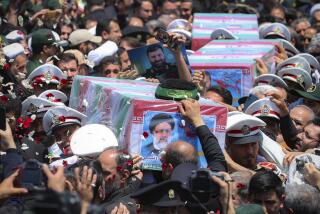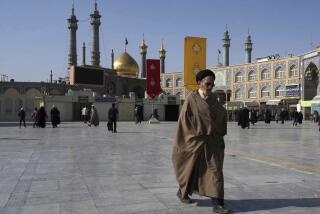Reported Murder Plot Cements Cleric’s Stature
- Share via
NAJAF, Iraq — The dark, intense eyes of Grand Ayatollah Ali Sistani stare soberly at Iraqis from mosque posters, car stickers, bookshop windows and framed photographs in offices and homes in this holy city -- and, increasingly, the vast swath of predominantly Shiite Iraq.
The omnipresent 75-year-old cleric, who has professed to be without political aspirations, is now arguably the most powerful man in the country. Any doubts about that were dispelled by the reaction to the reported attempt on his life here Thursday. The Arab world gasped collectively as word of the purported attempt was reported on satellite television channels throughout the region. A day later, it remained unclear what had happened, and Sistani’s office steadfastly denied any violent incident.
But the reaction suggests Sistani’s importance -- as well as the fragility of the political situation.
“A successful assassination of Sistani would be a disaster for Iraq,” said Joost Hiltermann of the International Crisis Group research organization. “He has been a voice of moderation ... and that moderating voice would be gone.
“There would be a need for revenge, so you would have a very bloody situation. There’s no one else with the stature to hold together the different factions.”
Sistani’s portraits initially remind many Westerners of his onetime colleague and fellow Iranian, the late Ayatollah Ruhollah Khomeini. But Sistani has acquired and exercised his influence in a vastly different manner.
Whereas Khomeini exhorted his followers to revolt and then took up the role of supreme political leader, Sistani has demonstrated his power as much by counseling restraint as by urging political action.
And although he has proved that he can summon tens of thousands of followers to the streets, he has accomplished this from the sheltered confines of his study -- shunning public appearances and issuing most pronouncements through intermediaries.
That unlikely combination of forcefulness alternating with reticence, of a public persona shaped by private deliberation, is the hallmark of Sistani’s leadership. And those very qualities have greatly complicated efforts by coalition officials and other political leaders in Iraq to anticipate Shiite Muslim wishes.
When Saddam Hussein was ousted last year, it was difficult to gauge what role the Shiite majority would play in the new Iraq. They had been brutally persecuted by Hussein, and no one knew whether they would choose moderation or extremism.
Paradoxically, Sistani has both resolved and deepened that mystery.
By forcefully asserting himself on key issues -- such his demand for direct elections for a transition government and his desire for a government with a more overtly Islamic cast than the United States might like -- Sistani has shown a determination to play a decisive role.
But having staked out these broad positions, Sistani has not clarified his views on subsidiary issues -- including the timetable and method of holding direct elections. And his refusal to meet face to face with U.S. civilian administrator L. Paul Bremer III or his emissaries often leaves in doubt exactly what he wants.
To some extent, Sistani appears to have chosen this strategic approach because it preserves his independence and leaves him room to maneuver in the next stages of Iraq’s political evolution.
But the mix of action and restraint also reflects the unusual range of pressures he faces.
Those forces include competition with other Shiite clerics for popular support, the bitter legacy of repression and reprisal, and his recognition of the need to protect Shiites’ status at this moment of political change.
Two of Sistani’s rivals have cast a long shadow over the cleric, pushing him to be more public in his expression of Shiite expectations for the new government. They are Muqtader Sadr, the young son of the revered Grand Ayatollah Mohammed Sadeq Sadr, who was killed by Hussein’s forces in 1999; and Abdelaziz Hakim, leader of the Supreme Council for Islamic Revolution in Iraq, whose brother, a leading cleric, was killed in an August bombing in Najaf.
“Sistani has done what he’s done in calling for elections because he wants to stay at the top of the Shiite system,” said Juan Cole, a professor of Middle East studies at the University of Michigan. “Shiism has a strong populist component, so he could face a stampede to other [religious] figures if he loses the street.”
Sistani cannot afford to ignore the fact that Sadr and Hakim have formidable political organizations and are protected and bolstered by armed groups. Both are well funded, running projects and charities and filling in the gaps left by bankrupt local governments.
Hakim’s Badr Brigade, a cadre of 10,000 armed Iraqis trained by Iran’s Revolutionary Guard, formally has been prohibited from bearing weapons but is widely believed to operate as a non-uniformed militia.
Sadr, who soon after the end of the war began to preach angry sermons against the U.S.-led occupation forces, has also tried to form an army. Although it remains an informal venture, he has been able to muster crowds of gunmen in several key southern cities, including Nasiriya and Al Kut.
Coalition officials say privately they believe that Sadr’s followers, and possibly Sadr himself, have been involved in violent episodes, including the death of a cleric in Najaf last year. In April, Abdel Majid Khoei, who returned from exile with a U.S. escort and whose father had been one of Sistani’s mentors, was stabbed to death in the gold-domed holy shrine of Imam Ali, just a few blocks from Sistani’s home and office.
A few days later, armed men, believed to be followers of Sadr, surrounded Sistani’s home, putting the Shiite leader under virtual house arrest.
They shouted slogans saying that Iraq should be left to the Arabs --implying that Sistani, as an Iranian, ought to give up his position. (Sadr is an Arab Shiite.)
Local tribesmen came to Sistani’s defense, but the experience apparently shook the ayatollah, and nine months later he rarely leaves his home.
In contrast to Sadr’s confrontational tactics, Hakim, who had spent nearly 20 years of exile in Iran and gets financial as well as spiritual sustenance from conservative Iranian ayatollahs, reached out to Sistani. Now Sistani cannot afford to alienate him.
At the same time that these internal rivalries are pushing him to be more active, Sistani’s training and background as a scholar who holds the most revered position in the Shiite religious world are pulling him in the opposite direction. As the most senior of grand ayatollahs, his had been a life devoted to study and reflection, one immersed in the largely private world of writing and counseling the faithful. He is known to receive anyone who comes to him with a problem. Every day, a line of more than 100 people snakes down the alley outside his office.
If they get inside, they find themselves in simple surroundings. Rajaa Habib Khuzaai, a gynecologist from southern Iraq who serves on the Governing Council, said she was surprised to find it had nothing more than “a few flat cushions on the floor, it was very modest.”
Sistani is a long way from his largely academic beginnings in the Iranian holy city of Mashad. His openness to women and women’s pursuit of learning may be rooted in his early childhood. His official biography notes that he learned to read the Koran from a woman who cared for him -- a striking point to make.
Sistani’s philosophy, in keeping with a venerable strain in the Shiite tradition, is to fuse deep Koranic learning with interpretations that reflect contemporary times. Unlike some Sunni Muslims who follow a more rigid form of Islam, the Shiites reinterpret the Koran to make it applicable to the changing troubles of the people.
Sistani, whose father and great-grandfather were both clerics, began his studies in Iran but moved to Najaf and then back to Iran, to the holy city of Qom, before finally settling in Najaf, where he has lived for most of the last 53 years.
However, he still speaks Arabic with a thick Persian accent and much of his focus is on Iran. Of the nine charitable ventures listed on one of his websites -- mostly housing complexes for religious students and pilgrims as well as some for the poor -- at least eight are in Iran. He also sponsors at least four religious foundations, all based in Iran and one of which has affiliate offices in Beirut and London.
This extensive network of Iranian connections leaves U.S. officials worried about whether Tehran has influence over his decisions.
Sistani’s worldview is steeped in the history of Shiite repression in the 20th century. A disastrous rebellion led by Shiite clerics against the British colonization of Iraq in 1921 resulted in numerous executions and the flight of many from the country.
“The Iraqis do not want to repeat what happened during the last century, during the British Mandate,” said Sheik Abdel Mehdi Karbalai, Sistani’s representative in the holy city of Karbala. “They feel that they lost their rights.”
That experience drove Sistani and the other three grand ayatollahs in Iraq, known as the Marjaiyah, to take a stand during the current conflict.
“Sistani declared from the beginning of the occupation that he didn’t side with either Saddam’s regime or the coalition forces,” Karbalai said.
“When the Marjaiyah realized there could be a repetition of the events of the last century with an oppressive government and oppressive laws ... it took upon itself to intervene and to show Iraqis how they can have a future free of the yoke of oppression.”
But it was the firsthand experience of the slaughter of scores of fellow clerics and thousands of Shiites under Hussein -- including an attempt on his own life in 1996 -- that appears to have convinced Sistani that the Shiites must seize this moment to ensure that they are never left so powerless again. And they can guarantee that only if they marshal their majority in the country to take power.
“Sistani and the Shiites understand that direct elections will serve them because they are the majority,” said Jaber Habib, a professor of political science at Baghdad University. “They have great power, and they want to exercise it.”
Times staff writer Megan K. Stack contributed to this report.
--- UNPUBLISHED NOTE ---
In stories after April 9, 2004, Shiite cleric Muqtader Sadr is correctly referred to as Muqtada Sadr.
--- END NOTE ---
More to Read
Sign up for Essential California
The most important California stories and recommendations in your inbox every morning.
You may occasionally receive promotional content from the Los Angeles Times.













